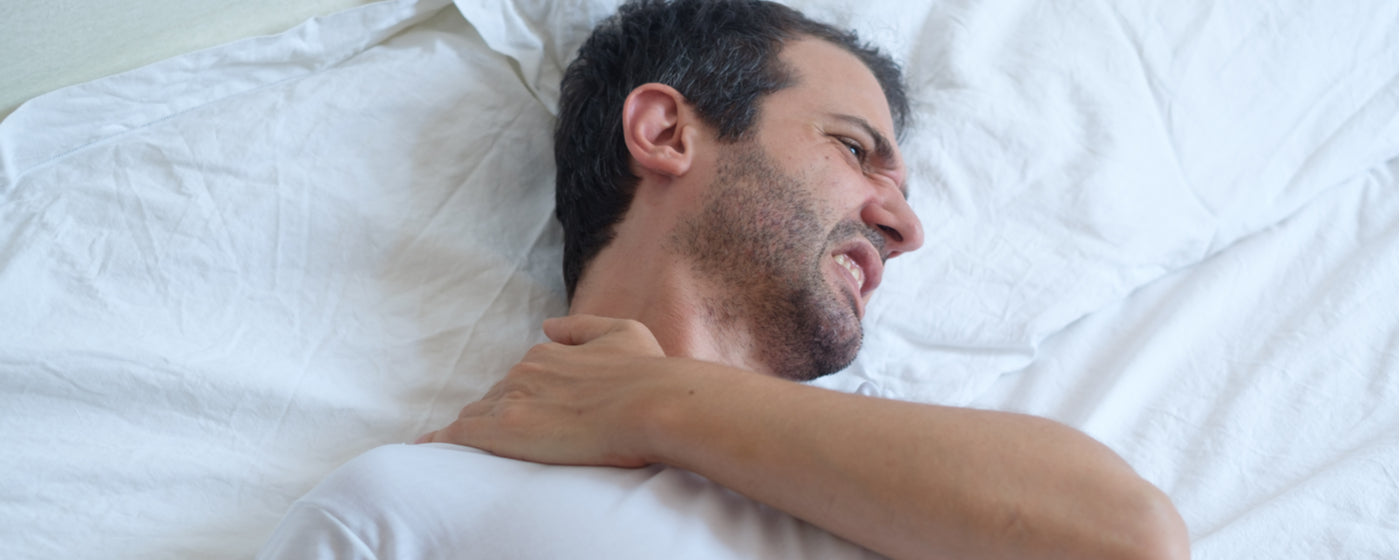Waking up with a sore neck can really put a dampener on your day; it can lead to headaches and make simple movements like turning your head very painful.
In most cases, a sore neck can be the result of a bad night’s sleep, caused by either your sleeping position, the type of pillow you use, or a combination of issues.
Let’s take a closer look at what you can do to put a stop to your neck pain and help you to enjoy a more restful night’s sleep.
Correct your sleeping position
What position you normally sleep in can affect your body in many different ways. Choosing to sleep on your side or on your back is easier on your neck as these sleeping positions cause less stress on your spine.
Sleeping on your stomach is not recommended as it can cause further neck pain as the back is arched and your neck is turned to the side, putting pressure on your nerves. While it can be difficult to change your sleep position, as you may move around in your sleep unknowingly, it's worth trying to start the night sleeping on your back or side to help to alleviate your neck pain.
Match your pillow to your position
The average person spends about 26 years sleeping, so choosing the right pillow is key to a healthy, pain-free neck. A pillow that doesn’t correctly support your head and neck can create tension in your neck muscles, causing neck pain.
If you sleep on your back, a low profile pillow is best to help maintain the correct curvature of your spine.
If you are a side sleeper and are under 6 feet tall, a medium profile pillow is best and if you are over 6 feet tall, a high profile pillow will help to properly support your spine and neck as you sleep.
Ensuring you have the proper pillow for your preferred sleeping position and height will ensure you receive optimal spinal alignment as you sleep, helping you to get a better night’s sleep and wake up pain-free.
Stretching for neck pain
Gently stretching your neck before bed and when you first wake up may also help you manage your pain. According to Ergolink, the following easy-to-do stretches may help relieve and prevent neck strain:
Lateral Neck Flexion Stretch
- Place your fingers on top of your head and pull your head slightly to the right.
- Once you feel the pull of the muscles in your neck, don’t go any further. Hold for 10-15 seconds and release.
-
Take a deep breath and do the same with the other side using your left hand to move your head slightly to the left until you feel the neck muscle pull slightly. Repeat on each side 3 times.
Forward Flexion Stretch
- Similar to the previous exercise but this one is stretching the back of your neck as well as the sides.
- Start by bending your head forward with your chin towards your chest.
- From this downward-facing position, move your left ear towards your left shoulder.
- Like the previous stretch, you can use your hand on your head to make the stretch stronger. Hold for 10-15 seconds.
-
Look up and repeat on the other side, repeating each side 3 times.
Chin Tuck
- Facing forward, slowly lower your chin towards your chest. You should feel a stretch in the back of your neck.
- Hold the stretch for 15 to 30 seconds before slowly returning your head to the forward position.
- Repeat the exercise 5 times.
When a Sore Neck Is Serious
If you wake up with a stiff neck, accompanied by a severe headache, fever, arm numbness, tingling or weakness or other unusual symptoms, medical attention must be sought immediately. Make an urgent appointment with your GP or, if the pain is very severe, seek emergency medical attention.
Spinaleze knows that a great day starts with a good night’s sleep, so by incorporating some of these lifestyle changes, you can help to reduce your neck pain and enjoy pain-free mornings!
*This content is not intended to be a substitute for professional medical advice, diagnosis, or treatment. Always seek the advice of your physician or other qualified health provider with any questions you may have regarding a medical condition.
This article should be used for informative purposes only and is not a substitute for a consultation with a health specialist.














